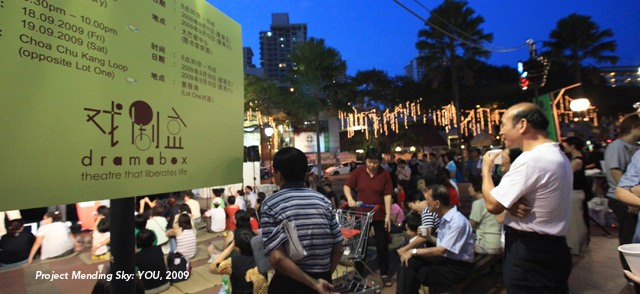
Applied Theatre / Drama: A Brief Glossary
Written by Koh Hui Ling
|
|
|
|
The most debated terms when the exercise to define Applied Theatre / Drama begins. Loosely explained, Drama explores conflict and focuses on process, where dramatic scenarios are constructed for lived-through creative exploration of various perspectives by the participants. Theatre, on the other hand, puts its focus on product, with the audience in mind. 
Mainly known to be the education and transference of theatre skills such as acting, directing, playwriting and production. The engagement of young people in creating and expressing through theatre, artistically, creatively as well as critically as an art form. It is used to as an umbrella term to talk about unconventional theatre spaces outside mainstream theatre setup, which usually involves the engagement of marginalised communities in discussing issues. It can include community-based theatre, interactive theatre, political theatre, prison theatre, theatre in healthcare and theatre in workplace etc. Applied Theatre work is therapeutic but therapy is not to be the objective of the work. This area of artistic and community building work is gaining popularity in Singapore in recent years. 
This refers to performances created by, of, with communities, with or without external help by artists / artsworkers. While exploring issues close to the participants' hearts, it also focuses on process and the aesthetics of the product. It builds community while cultivating its social capital. It is a form of theatre that uses pre-available materials, such as newspapers or primary accounts of stories from interviewees, ideally without a change in the choice of words used by them. Verbatim / testimonial theatre is form of Documentary Theatre. Known as the form that engages senior citizens in creating theatre, Reminiscence Theatre is created based on memories of the elderly and one of its main aims is to bridge the gap between generations as well as family members. The use of theatre and theatricality in museums to dialogue, educate, entertain and interact with issues or stories from artifacts, real characters and historical materials. It usually takes place in museums, but can also be performed at historical sites. It is most often performed by professional actors, with interactive activities that engage with the audience. The exploration of the educational aspect of theatre / drama as a form to connect thought and feeling so that participants can investigate and reflect on the themes at hand, experiment new ideas, learn new knowledge, construct new beliefs, and build self-esteem. The interactive use of Theatre as a pedagogy. It engages the audience with a subject matter through a series of pre-performance activities, a pre-rehearsed theatrical performance and ends with post-performance activities. Drama-in-Education is an educational pedagogy, most often applied in the teaching of mainstream curriculum via the use of dramatic conventions and establishment of dramatic scenarios. Students learn the curriculum through dramatic activities, being exposed to different perspectives. Dramatic conventions include Process Drama, Hot Seating, Role-Playing etc. |
|
|
|
|
Disclaimer: Above are brief explanations of the terms commonly used in the field of Applied Drama / Theatre. To get a better idea, here are some books:
- Tim Prentki and Sheila Preston, The Applied Theatre Reader, London: Routledge, 2008.
- Pam Schweitzer, Reminiscence Theatre: Making Theatre from Memories, London: Jessica Kingsley Publishers, 2006.
- Richard Schechner, Performance Studies: An Introduction, London: Routledge, 2006.
- Petra Kuppers, Community Performance: An Introduction, London: Routledge, 2007.
- Eugene van Erven, Community Theatre: Global Perspectives, London: Routledge, 2000.

|
Koh Hui Ling is the Associate Artistic Director of Drama Box. In 2004, she co-founded NeNeMas – then-education arm of Drama Box. She continues to oversee the development of work in schools and has developed a set of Drama-in-Education and Theatre-in-Education programmes targeted at youth, teachers and adult-learners. With many years of teaching and facilitating experience in educational institutions, Hui Ling continues to believe in the humanistic value of education and aspires to touch people with her work. With that passion, she founded ARTivate – the youth wing of Drama Box in 2007, aiming to groom the next batch of young artists for the theatre industry. She recently completed her Masters of Arts in Applied Drama (Distinction) at University of Exeter, UK in 2010. |


